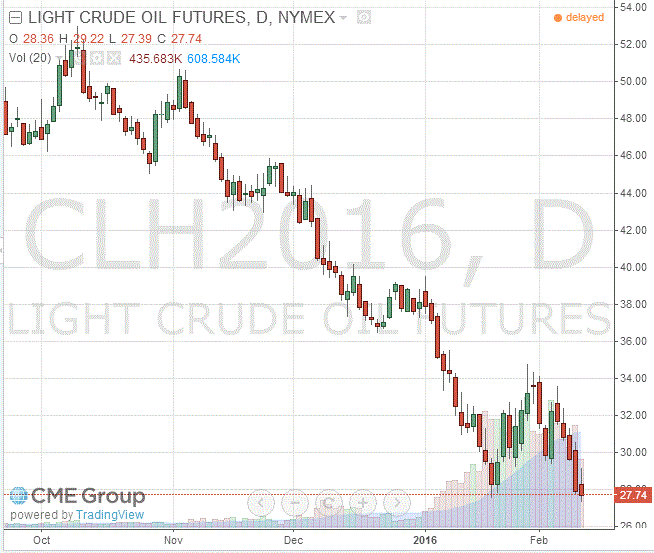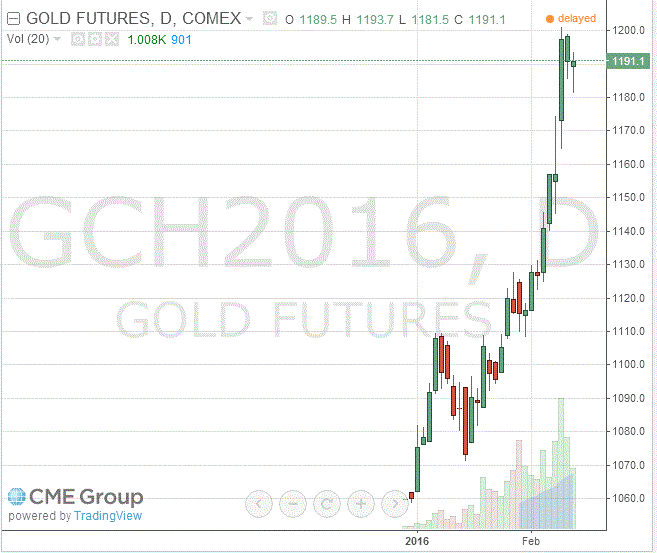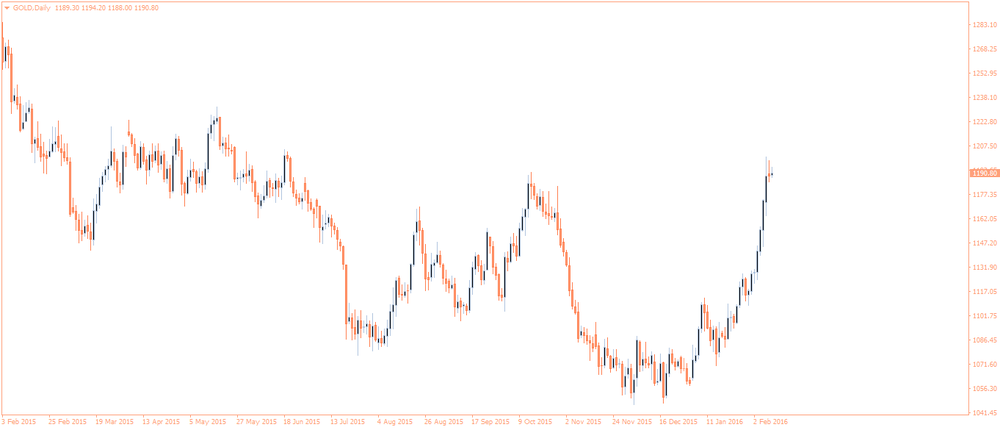Noticias del mercado
-
18:21
Fed Chairwoman Janet Yellen: it is unlikely that the Fed will cut its interest rate soon as the risk of recession is low
The Fed Chairwoman Janet Yellen testified before the House Financial Services Committee on Wednesday that it is unlikely that the Fed will cut its interest rate soon as the risk of recession is low.
"We've not yet seen a sharp drop-off in growth, either globally or in the United States, but we certainly recognize that global market developments bear close watching," the Fed chairwoman noted.
Yellen was not sure if negative rate are legal as she was asked about the implementation of negative interest rates.
"We didn't fully look at the legal issues around that. I would say that remains a question that we still would need to investigate more thoroughly," she said.
-
17:51
Oil prices trade mixed
Oil prices traded mixed as market participants eyed OPEC's monthly report and the U.S. crude oil inventories data. According to the U.S. Energy Information Administration (EIA) on Wednesday, U.S. crude inventories declined by 0.75 million barrels to 502.0 million in the week to February 05.
Analysts had expected U.S. crude oil inventories to rise by 3.6 million barrels.
Gasoline inventories increased by 1.3 million barrels, according to the EIA.
Crude stocks at the Cushing, Oklahoma, increased by 523,000 barrels.
U.S. crude oil imports dropped by 1.13 million barrels per day.
Refineries in the U.S. were running at 86.1% of capacity, down from 86.6% the previous week.
The Organization of the Petroleum Exporting Countries (OPEC) released its monthly report on Wednesday. OPEC said that oil supply rose by 130,000 barrels per day (bpd) to 32.33 million bpd in January, compared to December.
The group said noted that oil demand is expected to slow in 2016. Global oil demand growth is expected to be 1.25 billion bpd in 2016, down from its previous forecasts of 1.26 billion bpd. Demand for OPEC oil is expected to be 31.61 million bpd in 2016, down its previous forecasts of 31.65 million bpd.
Non-OPEC output is expected to decline 700,000 bpd in 2016 due to low oil prices.
The U.S. oil output is expected to drop by 470,000 bpd in 2016.
Global oil supply surplus is expected to be 720,000 bpd if OPEC continues to produce at its January pace, up from the previous estimate of 530,000 bpd.
WTI crude oil for February delivery declined to $27.74 a barrel on the New York Mercantile Exchange.
Brent crude oil for February rose to $30.90 a barrel on ICE Futures Europe.
-
17:48
Gold falls slightly due to decreasing demand for safe-haven assets
Gold price declined slightly due to decreasing demand for safe-haven assets as global stock markets rebounded.
The Fed Chairwoman Janet Yellen said in her prepared remarks before the House Financial Services Committee that further interest rate hikes will depend on the incoming economic data, adding that interest rate hikes will be gradual.
She noted that there is a risk from developments abroad to the U.S. economy.
"The economic outlook is uncertain. Foreign economic developments, in particular, pose risks to U.S. economic growth," Yellen said.
The Fed chairwoman also said that "financial conditions in the United States have recently become less supportive of growth".
March futures for gold on the COMEX today decreased to 1191.10 dollars per ounce.
-
16:53
U.S. crude inventories decline by 0.75 million barrels to 502.0 million in the week to February 05
The U.S. Energy Information Administration (EIA) released its crude oil inventories data on Wednesday. U.S. crude inventories declined by 0.75 million barrels to 502.0 million in the week to February 05.
Analysts had expected U.S. crude oil inventories to rise by 3.6 million barrels.
Gasoline inventories increased by 1.3 million barrels, according to the EIA.
Crude stocks at the Cushing, Oklahoma, increased by 523,000 barrels.
U.S. crude oil imports dropped by 1.13 million barrels per day.
Refineries in the U.S. were running at 86.1% of capacity, down from 86.6% the previous week.
-
16:05
Fed Chairwoman Janet Yellen: further interest rate hikes will depend on the incoming economic data
The Fed Chairwoman Janet Yellen said in her prepared remarks before the House Financial Services Committee that further interest rate hikes will depend on the incoming economic data, adding that interest rate hikes will be gradual.
She noted that there is a risk from developments abroad to the U.S. economy.
"The economic outlook is uncertain. Foreign economic developments, in particular, pose risks to U.S. economic growth," Yellen said.
The Fed chairwoman also said that "financial conditions in the United States have recently become less supportive of growth".
Yellen pointed out that a drop in stock markets, higher borrowing rates for riskier borrowers, and a further appreciation of the U.S. dollar could weigh on the outlook for economic activity and the labour market in the U.S.
She expects inflation to reach 2% target over the medium term, while the labour market is expected to continue to strengthen. Regarding the U.S. labour market, Yellen added that there remained some slack in labour markets.
-
15:09
OPEC’s monthly report: the group lowers its demand growth forecasts
The Organization of the Petroleum Exporting Countries (OPEC) released its monthly report on Wednesday. OPEC said that oil supply rose by 130,000 barrels per day (bpd) to 32.33 million bpd in January, compared to December.
The group said noted that oil demand is expected to slow in 2016. Global oil demand growth is expected to be 1.25 billion bpd in 2016, down from its previous forecasts of 1.26 billion bpd. Demand for OPEC oil is expected to be 31.61 million bpd in 2016, down its previous forecasts of 31.65 million bpd.
Non-OPEC output is expected to decline 700,000 bpd in 2016 due to low oil prices.
The U.S. oil output is expected to drop by 470,000 bpd in 2016.
Global oil supply surplus is expected to be 720,000 bpd if OPEC continues to produce at its January pace, up from the previous estimate of 530,000 bpd.
The group noted that low oil prices started to have a negative impact on the global economy.
"It seems that the overall negative effect from the sharp decline in oil prices since mid-2014 has outweighed benefits," OPEC said.
"Due to the after-effects from the 'great recession', the potential that consumer spending ability could rise, is limited," it added.
-
10:22
Iranian Oil Minister Bijan Zangeneh: the country is ready to cooperate with OPEC members over the current conditions in the global oil markets
Iranian Oil Minister Bijan Zangeneh said on Tuesday that the country is ready to cooperate with OPEC members over the current conditions in the global oil markets.
"We support any form of dialogue and cooperation with OPEC member states including Saudi Arabia," he said.
-
07:53
Oil prices climbed after heavy losses
West Texas Intermediate futures for March delivery rebounded to $28.40 (+1.65%), while Brent crude climbed to $30.83 (+1.68%) after posting steep losses in the previous session amid concerns over demand. Comments by Iran's oil minister supported oil prices later. He said Tehran was ready to discuss the current situation in oil markets with Saudi Arabia. However analysts say that Saudi Arabia is unlikely to negotiate.
The International Energy Agency cut oil consumption growth forecast to 1.17 million barrels per day for this year compared to growth of 1.6 million bpd in 2015. The agency estimated that global oil stocks will grow by 2 million bpd in the first quarter of the current year and by 1.5 million in the second quarter.
-
07:35
Gold near a 7-1/2-month high
Gold is currently at $1,191.10 (-0.63%) staying near a 7-1/2-month high on strong safe-haven demand. Falling stocks and concerns about health of the global economy support the precious metal.
Federal Reserve Chairwoman Janet Yellen will speak to the U.S. Congress later today. Her comments are likely to support bullion as she is expected to defend December rate hike and say that further rate hikes are coming, although at a slower pace. The non-interest-paying metal would benefit from prospects of slower rate increases.
-
01:03
Commodities. Daily history for Feb 9’2016:
(raw materials / closing price /% change)
Oil 28.35 +1.47%
Gold 1,189.40 -0.77%
-


